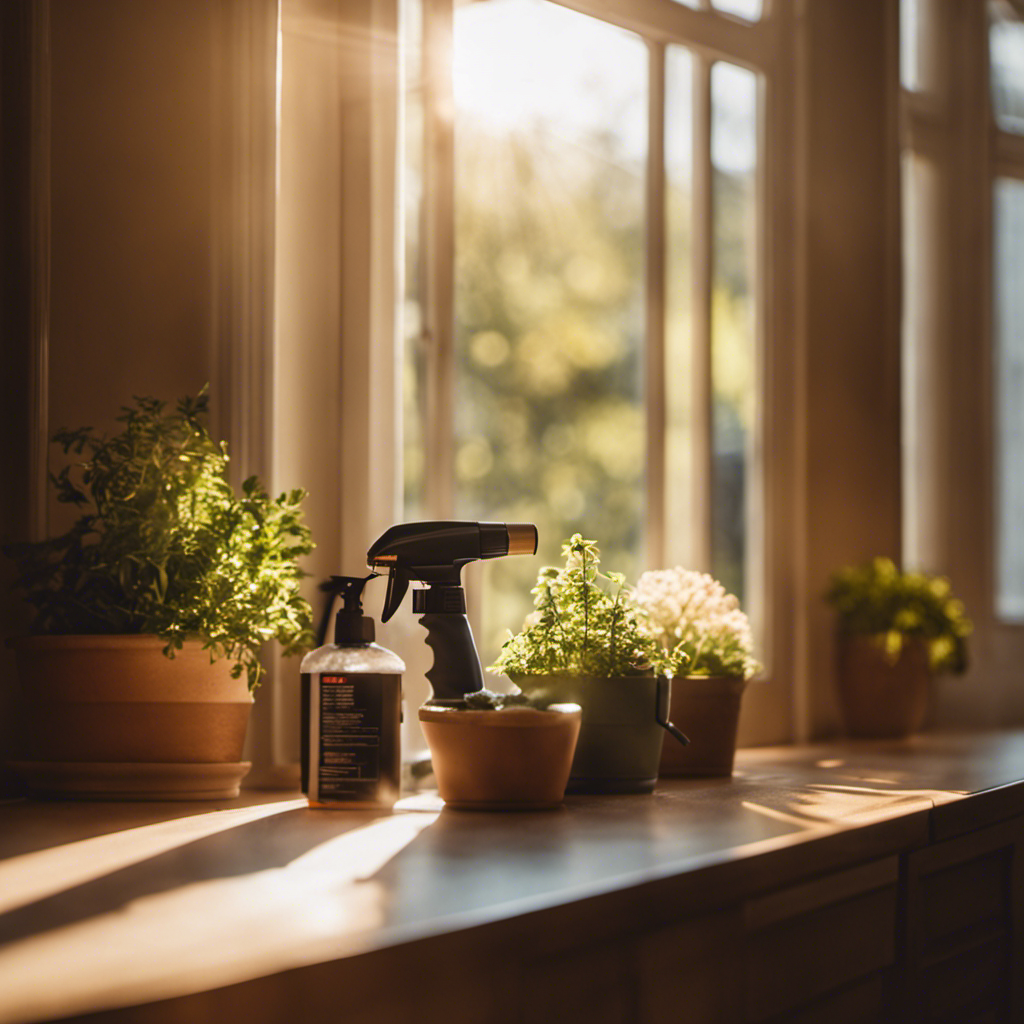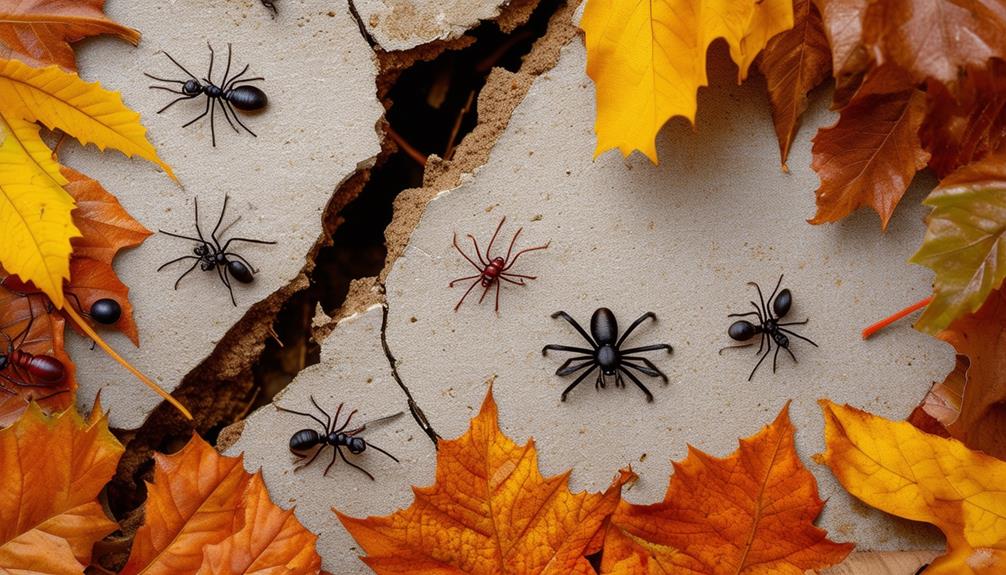Are you tired of dealing with pesky bugs invading your home? Wondering how often you should spray your house to keep them at bay? Look no further! In this article, we will provide you with expert advice on the frequency of bug spraying to maintain a bug-free home.
First, it is important to identify the types of bugs that have infiltrated your living space.
Next, consult with a pest control professional who can assess the severity of the infestation and offer targeted solutions.
Following their recommendations, regularly clean and declutter your home to eliminate potential bug hiding spots.
Implement preventative measures such as sealing cracks and crevices, and monitor and reevaluate as needed.
By following these steps, you can ensure a bug-free environment for you and your family.
So, let’s dive in and discover how to keep those unwanted critters away for good!
Key Takeaways
- Identifying the types of bugs in your home is crucial for effective eradication and requires careful observation of signs such as droppings, shed skin, chewed wires or wood, nests or webs.
- Consulting with a pest control professional is recommended to assess the severity of the infestation and determine the appropriate treatment plan, as DIY alternatives often fall short in providing long-term relief.
- The severity of the infestation will determine the spraying frequency, with low severity requiring spraying every 3-6 months, moderate severity needing spraying every 1-3 months, and high severity calling for monthly treatments.
- Following the recommendations of the pest control expert is essential, as treatment frequency depends on factors like the pest type and the extent of the infestation, and some infestations may require multiple treatments for complete eradication.
Identify the Types of Bugs in Your Home
Before you start spraying for bugs, it’s important to identify the types of creepy crawlies that have made themselves at home in your humble abode. Common household bugs can include ants, cockroaches, spiders, termites, and bed bugs. Each of these pests has unique characteristics and habits that require specific treatment methods.
To determine the presence of bugs, look out for signs of a bug infestation such as droppings, shed skin, chewed wires or wood, and visible nests or webs. Additionally, you may notice unusual smells, bites or rashes on your skin, or an increase in insect activity.
It’s crucial to correctly identify the bugs in your home to effectively eradicate them and prevent future infestations.
Consult with a Pest Control Professional
When consulting with a pest control professional, it’s crucial to discuss the frequency of spraying your home to keep those unwelcome critters at bay.
A consultation with an expert in the field can provide numerous benefits when it comes to bug control. They will assess the current bug situation in your home, identify the types of bugs present, and recommend the most effective treatment plan.
Additionally, they can provide valuable insights on the frequency of spraying based on the severity of the infestation and the specific bug species involved.
While DIY alternatives may seem tempting, they often fall short in providing long-term relief. By relying on a pest control professional, you can ensure that your home is properly protected against bugs and enjoy a pest-free environment all year round.
Consider the Severity of the Infestation
Take a moment to assess the severity of the infestation and let the urgency of the situation fuel your decision to seek professional help. Evaluating the severity of a bug infestation is crucial in determining the frequency at which your house should be sprayed. By considering the extent of the problem, you can better understand the level of intervention needed. To help you evaluate the severity, consider the following table:
| Severity Level | Description |
|---|---|
| Low | Few bugs or occasional sightings |
| Moderate | Some bugs present, regular sightings |
| High | Numerous bugs, constant sightings |
| Extreme | Infestation is out of control, widespread bugs |
Based on the severity level, you can determine how often your house should be sprayed. For low severity, spraying every 3-6 months may be sufficient. Moderate severity may require spraying every 1-3 months, while high severity may call for monthly treatments. In extreme cases, immediate and frequent spraying may be necessary to regain control over the infestation. Remember, consulting with a pest control professional is always the best course of action to ensure an effective and tailored treatment plan.
Follow the Recommendations of the Pest Control Expert
Trust the expertise of the pest control professional and follow their recommendations to effectively address the infestation and restore peace to your home.
Pest control methods and the frequency of bug infestations can vary depending on several factors. The pest control expert will assess the severity of the infestation and recommend a treatment plan that suits your specific situation.
They will consider factors such as the type of pests, the extent of the infestation, and the potential health risks involved. It’s important to understand that some infestations may require multiple treatments to completely eradicate the pests.
The frequency of spraying for bugs will also depend on the type of treatment used. Some treatments may require more frequent applications, while others may provide longer-lasting protection.
By following the recommendations of the pest control expert, you can ensure that your house is properly treated and protected from future infestations.
Regularly Clean and Declutter Your Home
To maintain a clean and organized living space, it is important to regularly clean and declutter your home. This will create an environment that is less attractive to pests. Decluttering has multiple benefits for your home. By removing unnecessary items, you eliminate potential hiding spots for pests like cockroaches and spiders. A clutter-free home also makes it easier to spot any signs of pest activity, allowing you to take prompt action. When cleaning your home, it is crucial to focus on areas that are prone to collecting dirt and crumbs, such as the kitchen and dining areas. Make sure to use effective cleaning methods, like vacuuming and mopping regularly, to eliminate food sources that may attract pests. Additionally, pay attention to cracks and crevices, as these can provide entry points for pests. By following these cleaning practices, you can create an environment that is less appealing to bugs and maintain a pest-free home.
Implement Preventative Measures
To keep pests at bay, it’s important to regularly inspect and seal any cracks or openings in your home. This will prevent bugs from entering and infesting your living space. Additionally, implementing preventative measures can greatly reduce the need for spraying your house for bugs. There are several natural remedies and DIY solutions that you can try to keep your home bug-free. For example, you can use essential oils like peppermint or lavender, which are known to repel insects. Another option is to create homemade traps using ingredients like vinegar or sugar to attract and capture pests. These methods not only help in controlling bug populations but also provide a safer and eco-friendly alternative to chemical sprays. By incorporating these preventative measures, you can effectively reduce the frequency of bug spraying in your home.
| Natural Remedies | DIY Solutions |
|---|---|
| Peppermint oil | Vinegar traps |
| Lavender oil | Sugar traps |
| Citrus peels | Borax mixture |
| Garlic cloves | Essential oil diffusers |
Monitor and Reevaluate as Needed
Monitoring and reevaluating regularly is crucial in maintaining a pest-free environment, ensuring that any potential infestations are identified and addressed promptly.
To effectively control bugs in your house, it is important to reassess the frequency at which you spray for bugs. While some houses may require quarterly treatments, others may need monthly or even weekly applications. Factors such as the climate, location, and previous pest issues should be taken into consideration when determining the appropriate frequency.
Additionally, it is essential to adjust the treatment method as needed. If you notice an increase in bug activity or if the current treatment is not effective, it may be necessary to switch to a different insecticide or seek professional help.
By regularly monitoring and reevaluating, you can ensure that your house remains bug-free and your family can enjoy a comfortable and safe living environment.
Frequently Asked Questions
Can I spray my house for bugs myself or should I hire a professional?
You can spray your house for bugs yourself using DIY bug spray, but hiring a professional has its benefits. They have specialized knowledge, tools, and expertise to effectively eliminate pests and ensure long-term prevention.
How do I identify the severity of a bug infestation in my home?
To identify the severity of a bug infestation in your home, look for signs like droppings, chewed wires, and nests. Prevent infestations by keeping your house clean, sealing cracks, and removing food sources.
Are there any natural or DIY methods I can use to prevent bugs in my home?
To prevent bugs in your home, try natural bug prevention methods and DIY bug control techniques. These include sealing cracks and crevices, keeping a clean environment, using essential oils, and setting up traps.
How frequently should I clean and declutter my home to prevent bug infestations?
To maintain a pest-free home, clean and declutter regularly. Use effective cleaning techniques like vacuuming, mopping, and wiping surfaces. Pay special attention to areas where bugs are likely to hide or enter, such as cracks and crevices.
When should I reevaluate and monitor my home for bugs after it has been sprayed by a professional?
Schedule a follow-up treatment after professional bug spraying within 2-3 weeks. Look for signs of bug activity like live or dead bugs, droppings, or new damage. Consider re-spraying if bugs return or if it has been over 6 months since the last treatment.





